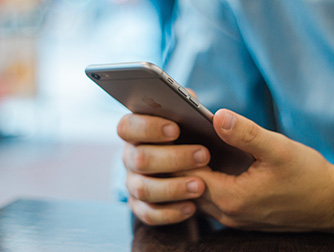- Create unique, impossible-to-guess passwords for each system you access.
- Use a combination of upper & lowercase letters, numbers, and symbols.
- Store your User IDs and Passwords in a safe location and do not share them with anyone. Do not store them under your keyboard or written in plain sight.
- Change passwords at least once per year.
- Keep your computer’s operating system, whether Windows or Mac, up-to-date. Make sure updates are set to Automatic.
- Require a password to login to your computer.
- Install a reputable anti-virus & firewall software on all computers. These should also be set to run and update automatically.
- Login to email, social networking, and banking sites directly from the provider’s website. Do not click links within an email to get to a login page.
- Do not use public computers (library, airport, hotel, etc…) to access your bank or credit card accounts online.
- Before entering a password, make sure the browser session is encrypted. Look for either the browser padlock (in the shape of a closed lock) or the web site address to begin with HTTPS.
- Do not click pop up messages that claim your computer is infected with a virus and can be resolved by purchasing additional software. This is usually a scam. Contact a trusted computer repair facility immediately.
- Require a PIN or password to access the device.
- Configure the device to automatically wipe all data if too many wrong PIN/password tries are attempted (such as 10 attempts).
- Keep the mobile operating system up-to-date, just like on a computer.
- If you get rid of the device, perform a factory reset or full wipe of all the data.
- Choose security questions & answers that are not well known about you. Or, you can even make up the answers.
- Click the Log Off button when you are finished on any secure site, instead of just closing the browser.
- Do not respond to a Forgot My Password email unless you just requested a new one.
- Check your accounts daily using our internet & telephone banking products.
- Setup account alerts through our internet banking product. We recommend Daily Balance and All Transactions alerts.
- Report any suspicious or fraudulent transaction to the bank immediately. With fraud, time is of utmost importance.
- Do not use your account number as your Access ID. If it already is, contact us and we will gladly assist you in changing it.
- Make your password impossible to guess. Use a combination of upper & lowercase letters, number, and symbols.
- Choose security questions & answers that are not well known about you. Or, you can even make up the answers.
- Click the Log Off button when you are finished on any secure site, instead of just closing the browser.
- Do not respond to a Forgot My Password email unless you just requested a new one.
- Marine Bank will never ask you to provide sensitive information, such as your SSN or password, via email. If you receive such an email, or have already responded to one, please notify us immediately.
- Use caution when opening attachments or clicking links within emails. Ask yourself:
Do I know & trust who sent this email?
Am I expecting it?
Does it make sense?
Are there misspellings, poor grammar, or is it strangely worded? - Never respond to an email asking to confirm your personal information or warning you of a closed account, lottery winnings, lost package, or family member stranded on vacation.
- When in doubt of an email’s authenticity, call the sender to verify.
- Using the Advanced Card Controls on the Marine Bank Mobile Banking App, get instant alerts when your card is used and prevent transactions that don't match your settings.
- Reduce the possibility of fraud on your debit card by not using it online. Instead, use a credit card which doesn’t contain your hard-earned money.
- If you are a business, use a credit card instead of a debit card. Business credit cards offer much more fraud protection due to government regulations.
- To use a Marine Bank debit card internationally, the PIN option must be used (instead of signature). Contact the bank if you plan to travel abroad.
- Report a lost or stolen debit card or suspicious charges immediately. For personal accounts, you are liable for only the first $50 of unauthorized transactions as long as you report them within 2 business days. If you do not report them within 60 days, you are liable for up to $500.
- Be aware of where your card is swiped. Don’t let it out of your sight.
- When using an ATM machine or gas pump, if it looks tampered with do not use your card.
Review your credit report for accuracy at least annually. The Federal Trade Commission allows you to request a free report from each bureau annually. You many obtain a free copy at www.annualcreditreport.com (Opens in a new Window) (Opens in a new Window).
If you believe you have been a victim of identity theft:
- Contact the three credit bureaus (see Resources section below)
- Close any accounts that may have been compromised.
- File a police report with local authorities.
- Report the theft to the Federal Trade Commission at www.ftc.gov/idtheft (Opens in a new Window) (Opens in a new Window) or 877-438-4338.
- Store financial and other sensitive documents in a secure locations, such as safe deposit box. Shred before throwing any away.
- Throw away any offer that asks you to pay for a prize or gift. Never provide your bank account information to such offers.
- Avoid foreign lottery, check overpayment, or secret shopper scams. These are forms of fraud and could leave you owing money.
You may place a security alert on your credit bureau file. This alert will flag your file for additional scrutiny at all credit reporting agencies. This service, which is free of charge, provides a significant layer of protection but you must contact the credit bureaus directly to request this alert.
By law, we cannot make this request on your behalf. If you choose to put a security alert on your file with one agency, that agency will notify the other agencies; however, the notification is timelier if you contact all three agencies. You may place or remove the security alert at any time by calling one of the following agencies:
Experian
P.O. Box 9556
Allen, TX 75013
(888) 397-3742
Equifax Credit Information Services, Inc.
P.O. Box 740256
Atlanta, GA 30374
(800) 685-1111
TransUnion Credit Bureau
P.O. Box 6790
Fullerton, CA 92834
(800) 680-7289
www.OnGuardOnline.gov (Opens in a new Window) (Opens in a new Window)
OnGuardOnline.gov is the federal government's website to help you be safe, secure, and responsible online.
www.IDTheft.gov (Opens in a new Window) (Opens in a new Window)
Government resources on identify theft
www.FDIC.gov/Consumers/Theft/ (Opens in a new Window) (Opens in a new Window)
Resources from the FDIC on how to protect yourself from identify theft and fraud.
www.Consumer.FTC.gov (Opens in a new Window) (Opens in a new Window)
Federal Trade Commission information on identify theft.
www.FTC.gov (Opens in a new Window) (Opens in a new Window) or www.usps.com (Opens in a new Window) (Opens in a new Window)
Information on mail fraud
Review your account. Review your Marine Bank account frequently using our convenient online banking service. If you notice suspicious activity and/or suspect identity theft, immediately contact us at (772) 231-6611.




